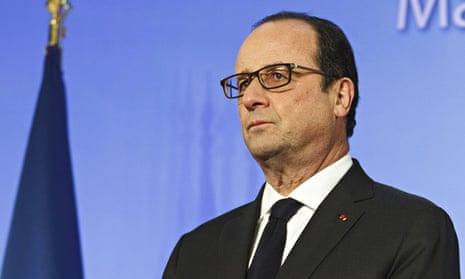François Hollande’s unpopular tax changes that imposed a 75% rate on earnings above €1m (£780,000) will quietly disappear into the history books from Thursday.
The French socialist president announced plans for the controversial measure during his 2012 election campaign as a means of forcing the wealthiest to help dig the country out of economic crisis.
Although supported by the left, the reform sparked accusations of an anti-business agenda. After the “supertax” was announced in September 2012 the government was accused of shooting itself in the foot by risking an exodus of high-profile personalities. Business leaders expressed fears that investors would pull out of France.
France’s richest man, Bernard Arnault, the chief executive of luxury group LVMH, took out Belgian nationality, and the actor Gérard Depardieu also moved across the border to Belgium before obtaining Russian citizenship.
High-earning French footballers threatened strike action, while league bosses warned they would no longer be able to attract world class players.
A majority of French taxpayers disapproved of the 75% rate, although polls showed that six out of 10 voters were in favour of raising income taxes on the wealthy.
Despite the backlash Hollande clung to the principle of the supertax even after it was dismissed by the country’s highest court, fearing a revolt by his leftwing allies. The tax was subsequently adjusted to a 50% rate payable by companies after the constitutional council ruling in December 2012.
The final nail in the coffin came from the former investment banker who is now France’s economy minister, Emmanuel Macron. A former economic adviser to Hollande, Macron described the supertax as “Cuba without the sun”.
With the party leftwingers having marched out of government in the days and months following the appointment of the openly pro-business Manuel Valls as prime minister last March, it was only a matter of time before the tax was dropped. The prime minister confirmed it would not be renewed in 2015 during a visit to London in October, where he addressed business leaders.
“The reform clearly damaged France’s reputation and competitiveness,” said Jorg Stegemann, the head of the executive search firm Kennedy Executive. “It clearly has become harder to attract international senior managers to come to France than it was.”
Tax lawyer Jean-Philippe Delsol, author on a book on tax exiles called Why I Am Going To Leave France, said last month many high earners had agreed with their companies that salaries would be limited during the two years the tax rate applied, and they would “come to an arrangement afterwards”.
Finance ministry studies showed that despite all the publicity, the sums obtained from the supertax were meagre, standing at €260m in 2013 and €160m in 2014, and affecting 1,000 staff in 470 companies. Over the same period, the budget deficit soared to €84.7bn.
The decision to drop the tax is a personal blow for Hollande and only one of a number of government U-turns since he was elected, fuelling criticism that he is indecisive and lacking presidential authority.



